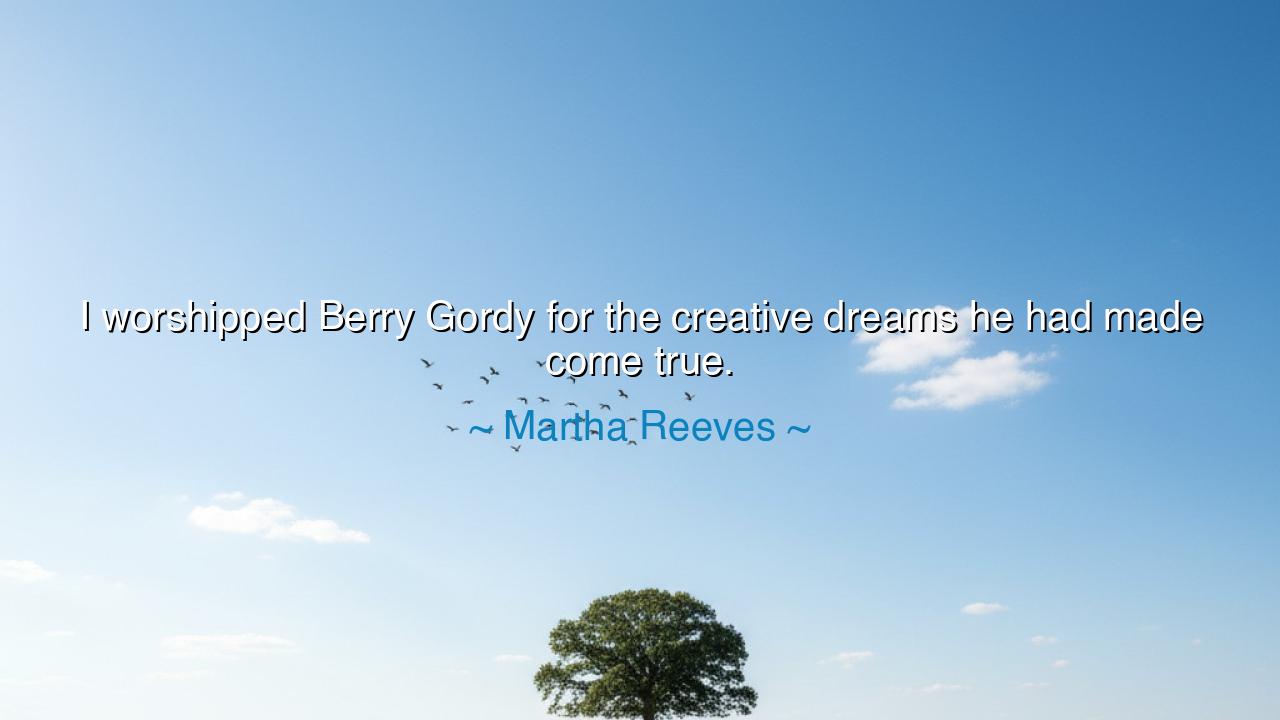
I worshipped Berry Gordy for the creative dreams he had made come






“I worshipped Berry Gordy for the creative dreams he had made come true.” – Martha Reeves
Hear now the words of Martha Reeves, the voice of soul and fire, who sang at the dawn of a golden age of music. In this simple confession, she does not merely speak of admiration, but of reverence—of the deep and sacred gratitude one feels toward a creator of dreams. When she says, “I worshipped Berry Gordy for the creative dreams he had made come true,” she speaks as an artist to her mentor, as one who witnessed the power of vision transformed into reality. To worship here does not mean to bow before a man, but to honor the divine spark of creativity that moved through him, the way a poet might honor the muse or a disciple might revere the master who awakened their purpose.
Berry Gordy, founder of Motown Records, was no mere producer of songs—he was the builder of a cultural kingdom. In the 1960s, when the world was divided by color and conflict, Gordy forged harmony where there had been division. He gathered voices from the streets of Detroit—young, hopeful, often unheard—and polished them until they shone like jewels. He believed that music, when guided by discipline and love, could unite hearts across all boundaries. Through his vision, artists like Martha Reeves, The Supremes, Stevie Wonder, and Marvin Gaye rose to immortality. The rhythm of Motown became the heartbeat of a generation, and through that beat, dreams once dismissed as impossible began to sing.
Reeves’s worship was born not of idolization, but of awe. For she had witnessed Berry Gordy’s creative dreams made flesh—the impossible made real by the force of will and imagination. She saw how an idea, when nourished by belief, can transform entire worlds. Gordy’s dream was not just to make music, but to make beauty accessible, to show that greatness could emerge from any corner, from any voice, from any skin. He built not only a company, but a legacy of empowerment—a living testament that the creative spirit is stronger than circumstance, and that vision can be the most powerful act of rebellion against despair.
In her words, Martha Reeves also reminds us of the sacred bond between mentor and artist. The mentor is the torchbearer, the one who holds faith when others do not yet see. Gordy’s genius was not only in his talent, but in his ability to believe in others. He looked upon unknown singers and saw destiny. He heard the trembling voice of a young performer and knew that with guidance, it could move nations. Reeves herself, once a secretary at Motown, was lifted by his vision into the realm of the immortal. Her reverence is that of one who remembers the hand that first pointed her toward the light.
Such stories echo throughout the ages. Michelangelo revered Lorenzo de’ Medici, whose patronage gave him the means to carve eternity from marble. Beethoven, though fiery and defiant, once bowed in gratitude to Haydn, his early teacher who nurtured his gift. And in every age, the creators of worlds—whether in art, music, or invention—have been sustained by those who saw dreams as sacred work, not mere fancy. When Reeves speaks of worship, she gives voice to that eternal truth: that to witness creation is to glimpse the divine, and to honor those who create is to honor the divine within them.
Yet there is a lesson here, both for the dreamers and for those who follow them. Martha Reeves’s words remind us that gratitude is the highest form of recognition, and that we must never forget those who opened the gates of opportunity before us. But her reverence also calls us to action—to become creators ourselves, to make our own dreams come true. For to merely worship the creator is not enough; one must continue the work, building upon the foundation laid by those who came before. Each generation inherits the torch of vision—it must not be admired from afar, but carried forward with courage.
So, my listener, take this teaching into your own heart: honor the dreamers, but also learn to dream as they did. Let Berry Gordy’s example and Martha Reeves’s gratitude remind you that greatness begins with the faith to act, to imagine, to persist. The power that turns creative dreams into reality lives not only in the chosen few, but in all who dare to believe. Worship not merely the creator, but the creation itself—the act of shaping something beautiful out of nothing. For in doing so, you too participate in that divine chain of inspiration, linking every artist, every builder, and every believer through the ages.
Thus spoke Martha Reeves, with the wisdom of one who had seen vision made flesh. She worshipped not the man, but the miracle of creation that burned within him—and by honoring that fire, she kept it alive. So may we all, in our own time, kindle that same flame: to dream, to create, and to lift others as we rise, until the world itself becomes a living song of hope, courage, and eternal imagination.






AAdministratorAdministrator
Welcome, honored guests. Please leave a comment, we will respond soon